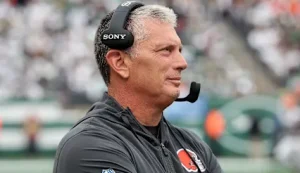‘Heartbroken’ by her rivals’ doping offenses, Shannon Rowbury is now set to receive a bronze medal – 12 years after she raced

For Shannon Rowbury, it was simultaneously one of the best and worst moments of her running career.
Part of her was thrilled and exhilarated to be competing in the finals of a second Olympic Games, and the roar of the crowd was like nothing she had experienced before – so loud that it seemed as though the ground was trembling inside the London Stadium.
Rowbury describes it as “the most out-of-body experience I’ve had in my entire life,” the noise only growing louder as she and her other competitors neared the finish line.
But for all the absorbing spectacle, the race also had dark secret, an underbelly of corruption owing to a raft of doping violations that would emerge over time. Today, the women’s 1,500-meter final at the London 2012 Olympics is considered one of the dirtiest races in the history of track and field.
Of the 13 athletes in the field, five are set to have had their results disqualified for doping violations. That includes Aslı Çakır Alptekin and Gamze Bulut, the two Turkish runners who were first and second across the line, and, most recently, Russian Tatyana Tomashova, who was moved up to the silver medal position after initially placing fourth.
It’s for these reasons that Rowbury has mixed feelings about the race; only now, more than a decade on, can she begin to look at the experience in a more positive light.
‘Dream come true’
Earlier this month, the Court of Arbitration for Sport (CAS) handed Tomashova a 10-year doping ban after samples she returned in June and July 2012 retested as positive for anabolic steroids – despite her arguing during a trial that she had never taken prohibited substances.
Tomashova’s results between June 2012 and January 2015 are also set to be disqualified, and she has until October 3 to appeal the decision. CNN has contacted Tomashova’s legal representatives for further comment.
Rowbury, having initially finished sixth at the Olympics, is now in line to be promoted to the bronze medal position – more than 12 years after the race. It would also make her the first American woman to win a 1,500m track medal at the Olympics, even if that accolade is only being recognized more than a decade after the fact.
When she first read the media statement from CAS, Rowbury says that she “just started shaking,” then bawled into her husband’s arms in what she calls a “release of 12 years of pain” and a “dream come true.
“Athletes in our position are very much in the dark,” she tells CNN Sport. “It’s super emotional because you’re hopeful that, after this thing that you have sort of suspected for so long, justice might actually be coming … After 12 years, I had kind of given up hope that it would ever happen.”
‘The most heartbreaking part’
Rowbury’s professional career came to an end in 2018, around the time that she became pregnant with her daughter. She competed at five world championships – winning bronze in the 1,500m in 2009 – and at three Olympics: Beijing 2008, London 2012 and Rio 2016.
Of all the challenges she faced in her career, it was the notion that some of her rivals had been doping that troubled her the most.
“I just couldn’t make peace with it,” says Rowbury. “I haven’t cried too often, but there have been a few things that have really struck a nerve … We were competing in a time that was unfortunately so dirty.
“It’s just been the most heartbreaking part,” she adds. “It was the thing that broke me about running, the doping in sport … In these races, it’s not just physical, it’s like we give, at least for me, the depth of my being, my soul. I’m trying to give everything I can to bring home that result that will make everyone proud.”
The amount of energy she was expending on her career, compounded by the fact that some of her fellow competitors were doping, meant that professional running was often a painful space for Rowbury to navigate.
After retiring, she says that she couldn’t even watch the Tokyo Olympics in 2021, such was her sense of disillusionment with the sport. She worked as an analyst for NBC during this year’s Games in Paris but was still plagued by a lingering sense of regret.
“It was bittersweet because I watched these races and I was thrilled that it seemed like it was a cleaner slate,” says Rowbury. “But I was also heartbroken again that I was a decade too early to be able to be a part of that.”
The 40-year-old is not alone in her plight. Her US teammate, Alysia Montaño, also discovered this year that, having originally placed fifth in the 800 meters, she is now set to receive a bronze medal from the London Olympics due to doping violations by rivals.
Rowbury becomes most emotional when she considers how differently her career might have gone if she had been recognized as an Olympic medalist at the time – the additional money and endorsement deals she might otherwise have earned.
“I don’t think I have the strength to really dig into it yet,” she says to CNN, adding, “I never wanted to sound bitter, I never wanted to sound jaded by it, so I just sort of buried it. I’m grateful to be able to kind of start unpacking all this for a positive reason.”
A California-native, Rowbury has entertained the prospect of receiving her bronze medal at the 2028 Olympics in Los Angeles, with her family and friends there to witness the moment.
“There’s a part of me that thinks that that would be a really incredible kind of closure to this crazy journey,” she says.
There are more running goals on the horizon, too. Rowbury is racing her first marathon in New York on November 3, and training for that has helped to readjust her relationship with the sport.
With her days as a full-time athlete behind her, she says that she still “deeply loves the sport of running” – the sense of community at local clubs and the buzz of energy at big races. Now, she is learning to appreciate those things in ways that didn’t seem possible when she was a professional athlete.
“I had kind of cut out all of the fun by the end, it felt like,” says Rowbury. “But the process of finding runs as a time for me in the day to clear my head, to connect to my body, and then connect with the community – it’s been really healing.”


